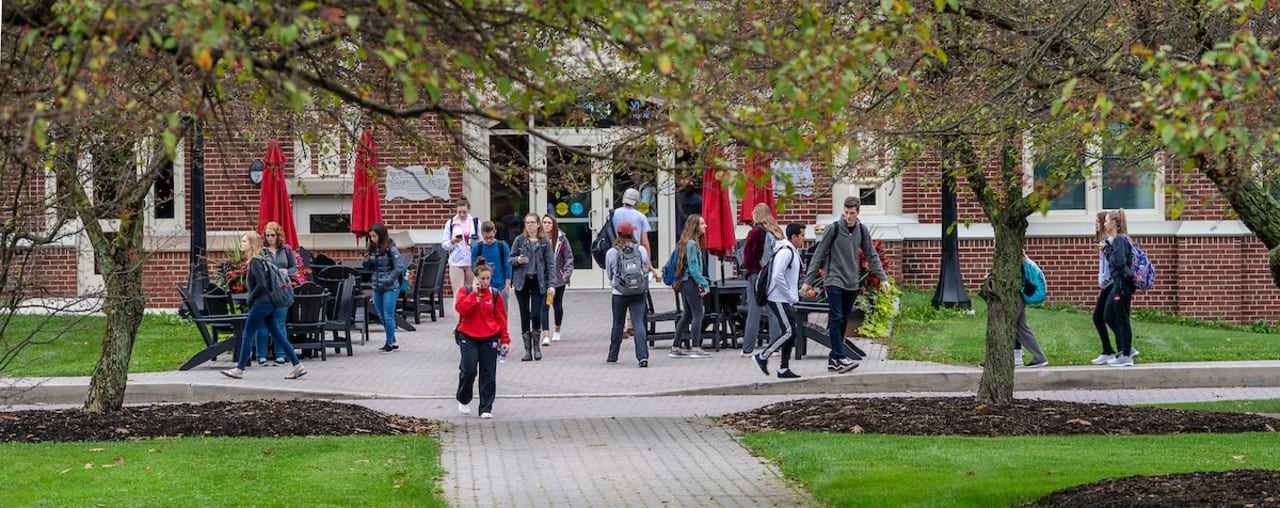
Bachelor of Science in Biology
Saint Francis University

Key Information
Campus location
Loretto, USA
Languages
English
Study format
On-Campus
Duration
4 years
Pace
Full time
Tuition fees
USD 53,340 / per year *
Application deadline
Request info
Earliest start date
Aug 2024
* this includes tuition, housing, and meals
Scholarships
Explore scholarship opportunities to help fund your studies
Introduction
Biology is the study of life in all of its variety and complexity. Biologists approach the study of life at levels ranging from molecular biology and physiology to ecology and evolution. Students of biology must each find the unique niche within this diverse field that best suits her or his passions.
Why Biology at SFU?
- Students First. The Biology Program at SFU is designed with the uniqueness of each student in mind. Our department provides customizable degree programs and personal academic advising by biology faculty.
- Small Class Sizes, a tight-knit community of students, and opportunities for students to engage in novel research with faculty mentors.
- High Success Rates. Many of our graduates go on to graduate schools and professional schools, while others use their bachelor degree to pursue careers in research, education, wildlife management, medical laboratories, as well as aquaria and zoos.
Why Study Biology?
Biologists are inquisitive professionals who seek to learn about the nature of life. Do you enjoy learning about animals or plants? Do you wonder how organisms in the field interact with their neighbors and their surroundings? Do you want to use hi-tech laboratory equipment to learn about the world of molecules and cells that lie within each us? Do you love all of the sciences? Biologists use tools from physics, chemistry, psychology, and even economics when trying to explain and understand the structure and function of living things.
Gallery
Career Opportunities
"What can I do with a degree in Biology?"
Biology is a diverse field of study, with a wide range of career opportunities. Below is a sampling of career options that our students have pursued.
Qualifications
- Students with a B.S. in Biology are qualified to work as laboratory technicians, assistants, or technologists. These jobs can pay well and offer excellent stability, particularly in industry.
- A Master's degree will allow more oversight and control, greater competitiveness for positions, and an increased range of career options
- A Ph.D., as well as post-doctoral training, is typically required for high-level research positions in industry or academics.
Some of the graduates schools our alumni have attended
- Case Western Reserve University
- Drexel University
- Indiana University of Pennsylvania
- George Mason University
- Georgetown University
- Mississippi State University
- Nicholls State University
- Penn State University
- Shippensburg University
- University of California, Davis
- University of Missouri-St. Louis
- West Virginia University
Healthcare
Professional Schools that our students have attended in recent years.
Medicine
- The Commonwealth Medical College
- Edward Via College of Osteopathic Medicine
- Griffith University School of Medicine, Australia
- Kentucky College of Osteopathic Medicine
- Lake Erie College of Osteopathic Medicine
- Nova Southeastern College of Osteopathic Medicine
- Penn State College of Medicine, Hershey
- Philadelphia College of Osteopathic Medicine
- Temple University
- University of Queensland School of Medicine, Australia
- West Virginia School of Osteopathic Medicine
Dentistry
- University of Pittsburgh
Optometry
- Salus University, Pennsylvania College of Optometry
Pharmacy
- Lake Erie College of Osteopathic Medicine
- Mylan School of Pharmacy, Duquesne University
- School of Pharmacy, University of Charleston
Podiatry
- Kent State University College of Podiatric Medicine
Veterinary Medicine
- Ohio State University
- Iowa State University
Medical Laboratory Science
- Conemaugh School of Medical Technology
- UPMC Altoona School of Medical Technology/Medical Laboratory Science
Program Outcome
While completing their degrees in the Saint Francis University Biology program, our students achieve the following learning objectives:
- Employ the scientific method, including the use of discipline-specific techniques, to discover and validate biological knowledge.
- Demonstrate scientific literacy through reading, writing, presenting, and discussing research.
- Demonstrate knowledge of how atoms and molecules interact to permit the function of living systems, and how cells sense, control, and respond to stimuli in their environments.
- Demonstrate knowledge of molecular genetics and how this leads to the expression and inheritance of traits.
- Explain how organisms reproduce and develop, how their anatomical structure permits function, how they maintain internal conditions, and how they sense and respond to external stimuli, across the full range of biological diversity.
- Describe how evolution by natural selection explains the unity and diversity of life on earth, and articulate how organisms interact at the population, community, and ecosystem levels.
Admissions
Curriculum
The Biology, B.S. degree provides training to students across all major fields of the biological sciences, including molecular and cellular biology, organismal biology, ecology, and evolution. The requirements include a core curriculum common to all biology majors, as well as electives that are selected from clusters that represent major levels of analysis within the biological sciences. This program provides considerable flexibility to help students prepare for a variety of career paths in the biological sciences.
Concentrations in Biology, B.S. include:
- Biology, B.S., Ecology & Environmental Biology Concentration
- Biology, B.S., Marine Biology Concentration
- Biology, B.S., Molecular Biology Concentration
- Biology, B.S., Pre-Medicine Concentration (Pre-Dental, Pre-Medical, Pre-Optometry, Pre-Pharmacy, Pre-Podiatry, Pre-Veterinary)
- Biology, B.S., Secondary Education Concentration or Biology, B.S., Secondary Education Concentration/Special Education Concentration
English Language Requirements
Certify your English proficiency with the Duolingo English Test! The DET is a convenient, fast, and affordable online English test accepted by over 4,000 universities (like this one) around the world.